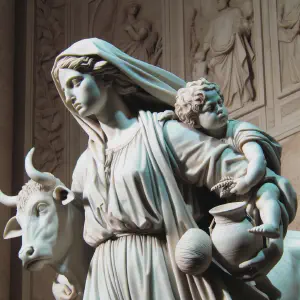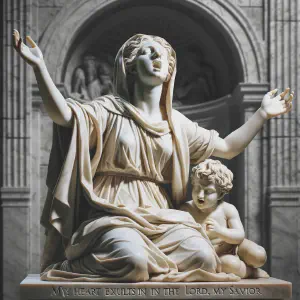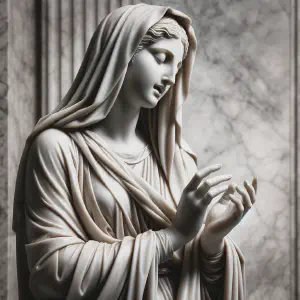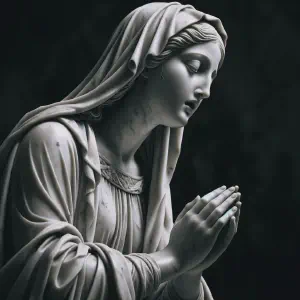Echoes of Faith



As Mary stayed with Elizabeth, her heart filled with the realization of the Lord’s enduring promise—the promise made to Abraham and his descendants. In her song, in her womb, the fulfillment of ages was taking shape. Just as Samuel grew up in the Lord’s service, so would her son, Jesus, grow to fulfill the greatest promise of all. In these two women, Hannah and Mary, the fabric of faith was woven, their lives and songs a testament to God’s unending mercy and his remarkable way of bringing greatness from the humblest of beginnings.
Five Questions
How does Hannah’s act of dedicating Samuel to God reflect her faith and relationship with Him?
Hannah’s act is a profound display of faith and trust in God. It shows her deep understanding of God as the giver of all gifts. By dedicating Samuel, she acknowledges that her son is ultimately a blessing from God. Her action goes beyond mere gratitude; it’s an expression of her unwavering faith and a testament to her belief in God’s sovereignty over all aspects of life.
What is the significance of Mary’s song, the Magnificat, in the context of the readings?
Mary’s Magnificat is a powerful declaration of God’s justice and mercy. It connects deeply with Hannah’s story, reflecting the theme of God uplifting the humble and the lowly. Mary praises God for His mighty deeds and His faithfulness in keeping promises. This song not only celebrates God’s actions in her own life but also His ongoing work throughout history, fulfilling His promises to Abraham and his descendants.
In both Hannah’s and Mary’s songs, there is a theme of reversal where the mighty are brought low and the lowly are lifted. What does this tell us about God’s nature?
This theme highlights a fundamental aspect of God’s nature – His preference for the humble and the oppressed. It underscores the idea that God’s kingdom often operates in ways counter to worldly expectations. He often chooses the least, the last, and the lost to demonstrate His power and grace. This shows that God values humility, righteousness, and faith over worldly power and status.
Considering Hannah’s and Mary’s experiences, what role does prayer play in their stories?
Prayer is central in both Hannah’s and Mary’s lives. For Hannah, prayer is a way of pouring out her heart to God, expressing her deepest desires and pains. It’s her prayer that leads to Samuel’s birth and her subsequent act of thanksgiving. For Mary, her song is a form of prayer that magnifies God and reflects on His goodness. These instances show that prayer is a powerful means of communication with God, a way to express our deepest emotions, and a tool for understanding and accepting God’s will.
How can modern believers draw inspiration from the stories of Hannah and Mary in their own spiritual lives?
Modern believers can draw inspiration from Hannah and Mary by embracing their examples of faith, humility, and trust in God’s plan. They show us the importance of turning to God in prayer, especially in times of need or uncertainty. Their stories encourage us to recognize and celebrate God’s work in our lives, even in unexpected ways. They also remind us that true greatness in God’s eyes often comes through humility, devotion, and a willing heart.
Bible Study
1 Samuel 1:24-28
In those days,
Hannah brought Samuel with her,
along with a three-year-old bull,
an ephah of flour, and a skin of wine,
and presented him at the temple of the LORD in Shiloh.
After the boy’s father had sacrificed the young bull,
Hannah, his mother, approached Eli and said:
“Pardon, my lord!
As you live, my lord,
I am the woman who stood near you here, praying to the LORD.
I prayed for this child, and the LORD granted my request.
Now I, in turn, give him to the LORD;
as long as he lives, he shall be dedicated to the LORD.”
She left Samuel there.
This passage describes Hannah’s fulfillment of her vow to dedicate her son Samuel to God. Hannah, a devout woman, had prayed fervently for a child and promised to dedicate her child to God’s service. Samuel, her son, represents an answered prayer and a gift returned to God. This act exemplifies the Catholic values of faithfulness, gratitude, and self-sacrifice. It aligns with the act of mercy of dedicating oneself to the religious life and reflects the importance of keeping vows, as highlighted in the Catechism of the Catholic Church.
1 Samuel 2:1, 4-5, 6-7, 8abcd
R. (see 1a) My heart exults in the Lord, my Savior.
“My heart exults in the LORD,
my horn is exalted in my God.
I have swallowed up my enemies;
I rejoice in my victory.”
R. My heart exults in the Lord, my Savior.
“The bows of the mighty are broken,
while the tottering gird on strength.
The well-fed hire themselves out for bread,
while the hungry batten on spoil.
The barren wife bears seven sons,
while the mother of many languishes.”
R. My heart exults in the Lord, my Savior.
“The LORD puts to death and gives life;
he casts down to the nether world;
he raises up again.
The LORD makes poor and makes rich,
he humbles, he also exalts.”
R. My heart exults in the Lord, my Savior.
“He raises the needy from the dust;
from the dung heap he lifts up the poor,
To seat them with nobles
and make a glorious throne their heritage.”
R. My heart exults in the Lord, my Savior.
This passage is part of Hannah’s prayer, expressing joy and gratitude for God’s intervention in her life. It highlights themes of divine justice and mercy, particularly how God humbles the proud and exalts the humble. The reversal of fortunes depicted aligns with Catholic teachings on God’s preferential option for the poor and marginalized, as seen in the Beatitudes and the acts of mercy. It also reflects the understanding of God’s sovereignty and providence, key aspects of Catholic faith.
Luke 1:46-56
Mary said:
“My soul proclaims the greatness of the Lord;
my spirit rejoices in God my savior.
for he has looked upon his lowly servant.
From this day all generations will call me blessed:
the Almighty has done great things for me,
and holy is his Name.
He has mercy on those who fear him
in every generation.
He has shown the strength of his arm,
and has scattered the proud in their conceit.
He has cast down the mighty from their thrones
and has lifted up the lowly.
He has filled the hungry with good things,
and the rich he has sent away empty.
He has come to the help of his servant Israel
for he remembered his promise of mercy,
the promise he made to our fathers,
to Abraham and his children for ever.”
Mary remained with Elizabeth about three months
and then returned to her home.
Known as the Magnificat, Mary’s song of praise reflects her humility and deep faith. Mary, the mother of Jesus, acknowledges God’s favor in choosing her for a significant role, despite her lowly status. The passage echoes the themes of social reversal and divine justice. It aligns with Catholic teachings on the dignity of the poor and God’s merciful love. The Magnificat is also a model of prayer, praising God for His mighty deeds and faithfulness, resonating with the Catholic emphasis on gratitude and trust in God’s plan.
Lessons
The readings from 1 Samuel and Luke highlight the profound nature of faith and humility in God’s plan. Hannah, in her deep faith, dedicates her long-prayed-for son, Samuel, to God, embodying a spirit of gratitude and selflessness. Similarly, Mary’s Magnificat reflects a humble acceptance of God’s will, acknowledging His power to uplift the lowly and fulfill His promises. These passages teach us the importance of trusting in God’s plan, the virtue of humility in receiving God’s blessings, and the joy of expressing gratitude through our lives. They remind us that our faith journey is marked by moments of surrender and praise, as we recognize God’s work in the tapestry of our lives.
Meditation Prayer


